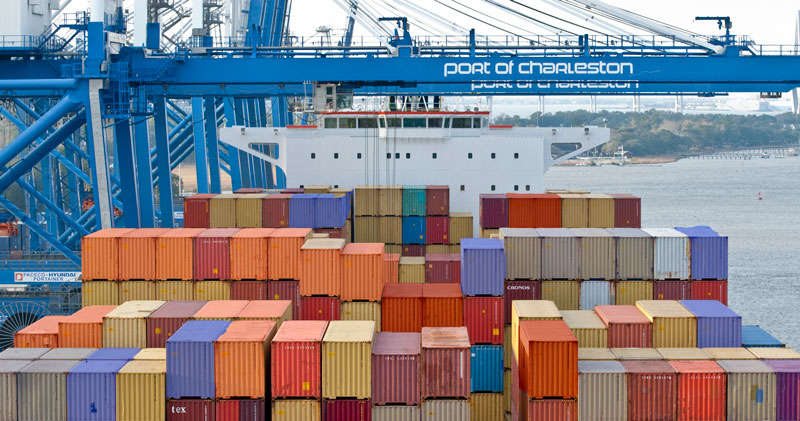South Carolina’s sales and use tax rate is 6%.
Counties, by approval of a majority of county voters, may assess an additional 1-4% local option sales tax. Proceeds go towards infrastructure improvements or a rollback of property taxes. A variety of sales tax exemptions for companies is offered.
For additional information regarding the South Carolina taxes, contact the South Carolina Department of Revenue.
-
Sales and Use Tax
Sales and Use Tax
The sales and use tax rate in South Carolina is 6%. Some counties assess a local option sales tax and/or a capital project sales tax, which currently range from 1 to 4%. Proceeds of such local taxes go toward infrastructure improvements or a rollback of property taxes.
The sales tax applies to all retail sales, leases and rentals of tangible personal property, including the value of property purchased at wholesale and then used or consumed by the purchaser. The use tax is based on the sales price of such property.
-
Out-of-State Sales
Out-of-State Sales
South Carolina exempts sales tax on the gross proceeds of the sales of tangible personal property where the seller, by contract of sale, is obligated to deliver to the buyer, an agent of the buyer or a donee of the buyer, at a point outside of South Carolina or to deliver it to a carrier or to the mails for transportation to a point outside of South Carolina.
-
Out-of-State Purchases
Out-of-State Purchases
South Carolina provides a use tax credit for purchases of tangible personal property paid in another state, if the state in which the property is purchased and the sales and use taxes are paid allows substantially similar tax credits on tangible personal property purchased in this state. If the amount of the sales or use tax paid in the other state is less than the amount of use tax imposed in South Carolina, the user is required to pay the difference to this state.
Sales Tax Incentives
-
Sales Tax Exemptions
Sales Tax Exemptions
South Carolina supports new and expanding industry with a wide range of valuable exemptions to the sales tax (state and local). These exemptions include the following:
- Machinery and equipment, and applicable repair parts, used in the production of tangible goods;
- Materials that will become an integral part of the finished product;
- Coal, coke or other fuel for manufacturers, transportation companies, electric power companies and processors;
- Industrial electricity and other fuels used in manufacturing tangible personal property;
- Research and development machinery and equipment;
- Air, water and noise pollution control equipment;
- Material handling equipment for manufacturing or distribution projects investing $35 million or more in the state;
- Packaging materials; and
- Long distance telephone calls and access charges, including 800 services.
In addition, South Carolina offers the following exemptions:
Construction Materials
Construction materials used in the construction of a single manufacturing or distribution facility with a capital investment of at least $100 million in an 18 month period will be exempt from sales tax.
Technology Intensive Materials
“Technology intensive” companies locating or expanding in South Carolina may be exempt from some sales and use taxes when the new or expanding facility meets certain investment and job creation requirements. For a company to qualify for these exemptions, the expanding and/or new facility must:
- Qualify as a “technology intensive facility” which is defined as a facility at which a firm engages in the design, development and introduction of new products or innovative manufacturing processes, or both, through the systematic application of scientific and technical knowledge. It includes North American Industrial Classification Systems (“NAICS”) Manual codes 5114 (database and directory publishers), 5112 (software publishers), 54151 (computer systems design and related services), 541511 (custom computer programming services), 541512 (computer design services), 541711 (research and development in biotechnology), 541712 (research and development in physical, engineering and life sciences), 518210 (data processing, hosting and related services), 9271 (space research and technology), or a facility primarily used for one or more activities listed under the 2002 version of the NAICS codes 51811 (Internet Service Providers and Web Search Portals.);
- Invest at least $300 million in real or personal property at the facility over a five year period, 60% of which must be spent on computer equipment; and
- Create at least 100 new jobs within a five year period with an average wage that is at least 150% of the state per capita wage.
The items that may be exempt from sales and use tax are: computer equipment, electricity used by the facility and equipment and raw materials. Once qualified for this exemption, all future computer equipment purchases are exempt.
Recycling Equipment
For a new or expanding recycling facility that invests at least $150 million by the end of the fifth calendar year after the year in which the company begins construction or operation of the facility, South Carolina provides certain exemptions from sales and use tax. The facility must manufacture products for sale composed of at least 50% post-consumer waste material by weight or volume. The items that will be exempt from sales and use tax are as follows:
- Recycling property used at the facility;
- Electricity, natural gas, propane or fuels of any type, oxygen, hydrogen, nitrogen or gases of any type and fluids and lubricants used by the facility;
- Tangible personal property that becomes, or will become, an ingredient or component part of products manufactured for sale by the facility;
- Tangible personal property of, or for, the facility which is, or will be used: (1) for the handling or transfer of post-consumer waste material, (2) in, or for, the manufacturing process or (3) in, or for, the handling or transfer of manufactured products; and
- Machinery and equipment foundations used, or to be used, by the facility.
Datacenter Materials
Datacenters locating or expanding in South Carolina may be exempt from some sales and use taxes when the new or expanding facility meets certain investment and job creation requirements. For a company to qualify for these exemptions, the expanding and/or new facility must:
- Be certified by the SC Department of Commerce as a qualifying datacenter;
- Invest at least $50 million (or a combined $75 million with one or more other companies) in real or personal property at a single facility over a five year period;
- Create at least 25 new jobs within a five year period with an average wage that is at least 150% of the state or county per capita wage, whichever is lower; and
- Maintain the 25 jobs for at least 3 years.
The items that may be exempt from sales and use tax are: computer equipment, software and electricity directly used in datacenter operations. Once qualified for this exemption, all future computer equipment purchases are exempt.
If the company does not meet the investment or job creation requirements, the company must pay back the entire amount of sales tax exempted.
If the company meets the investment and job creation requirements within the five year period but fails to maintain the 25 jobs for three years, the company may obtain a pro-rata exemption on sales taxes paid for electricity but not for computer hardware or software.
Sales Tax Caps
South Carolina provides a maximum cap of $500 for sales tax or infrastructure maintenance fee, as applicable, cap on the sale or lease of aircraft, motor vehicles, motorcycles, boats, recreational vehicles and other items.















